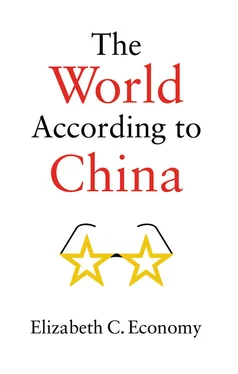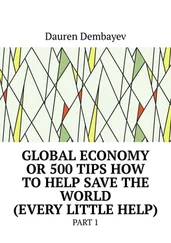To begin with, China’s leaders want to reclaim their country’s centrality on the global stage. A frequent refrain among Chinese officials today is that the last two centuries in which China was not the dominant global economy were an historical aberration. The current period, however, in which China’s economy will soon surpass that of the United States, will mark a return to its rightful place and cement a shift in the two countries’ relative influence on the global stage.
As a new geostrategic landscape emerges, China will be at the center, but with an altered geography that includes Chinese control over contested territories. There is no rejuvenation of the great Chinese nation without reunification. Chinese leaders are particularly focused on maintaining control within their own border regions, including the Xinjiang Uyghur Autonomous Region, the Tibet Autonomous Region, and the Hong Kong Special Adminstrative Region, and asserting control over areas they consider core interests, such as Taiwan and a vast swath of the South China Sea. China also has outstanding territorial disputes that it wants resolved in its favor with other countries, including India, Japan, Nepal, Bhutan, and South Korea. In 2018, speaking before the National People’s Congress, Xi stated, “It is the shared aspiration of all Chinese people and in the fundamental interests of the Chinese nation to safeguard China’s sovereignty and territorial integrity and realize China’s complete reunification … [A]ny actions and tricks to split China are doomed to fail.” 7Xi is particularly insistent that Taiwan, which thus far remains out of his grasp, is already part of China: “People on both sides of the Straits are one family, with shared blood” and, as such, “no one can ever cut the veins that connect us.” 8Although Chinese leaders often discuss the country’s rejuvenation as part of a peaceful and inevitable trend in international relations, Xi also makes clear that peace and stability will never come at the cost of China’s sovereignty: “While pursuing peaceful development, we will never sacrifice our legitimate rights and interests or China’s core interests. No foreign country should expect China to trade off its core interests or swallow bitter fruit that undermines China’s sovereignty, security or development interests.” 9
From there, Chinese influence and power extend through the Asia Pacific, which Chinese leaders portray as seamlessly integrated through Chinese-powered trade, technology, infrastructure, and shared cultural and civilizational ties. Xi likens the nations of the Asia Pacific to a “big family,” in which “the region cannot prosper without China” and “China cannot develop in isolation from the region.” 10While much of Xi’s emphasis is on the value of integration through trade, security also plays a central role. In 2014, Xi proposed the establishment of a new regional security cooperation architecture for Asia, arguing: “In the final analysis let the people of Asia run the affairs of Asia, solve the problems of Asia and uphold the security of Asia.” 11According to Xi, cooperation could include a code of conduct for regional security, an Asian Security partnership program, and coordination on law enforcement. He reiterated the idea in 2015, when he proposed a uniquely “Asian community with a shared future.” 12Implicit in Xi’s “Asia for Asians” construct is a much-diminished role for the United States, which is the current dominant power and guarantor of regional security. In the new world order, the United States has largely retreated back across the Pacific, returning to its historic role as an Atlantic power. Wang Jisi of Peking University (PKU) explains the Chinese leader’s views as natural and designed to “solidify China’s role as a regional power.” 13
Chinese influence further radiates through the rest of the world via infrastructure, ranging from ports, railways, and highways to fiber optic cables, e-commerce, and satellite systems. In the same way that US, European, and Japanese companies led the development of much of the world’s 20th-century infrastructure development, Chinese companies are competing to lead in the 21st century. The spoils of the competition will be long-lasting, entrenching the winner’s technology, standards, and know-how throughout the world for decades to come.
Xi Jinping’s ambition to embed Chinese influence globally also extends beyond physical constructs. One of his most dramatic foreign policy innovations has been the promotion of China’s political model and the export of some of its authoritarian elements, such as state control over the internet. Although scholars and officials had engaged in initial discussions of a China model after the global financial crisis – web entries on the topic jumped from approximately 750 in 2008 to 3,000 in 2009 14– the Chinese leadership at the time rejected the notion of an exportable Chinese model. Then premier Wen Jiabao stated definitively that “China never sees its development as a model…. All countries have their own development paths that suit their national conditions.” 15Xi, however, has introduced a different, more confident and more competitive approach.
In a January 2013 speech before the CCP’s top 200-odd officials, only two months after becoming CCP General Secretary, Xi posited an existential competition between China’s model and that of the West. He described the post-Cold War period as one in which many developing countries were forced to adopt the Western model, leading to “party feuds, social unrest, and people left homeless and wandering.” He continued on to argue: “We firmly believe that as socialism with Chinese characteristics develops further, our system will inevitably mature; it is likewise inevitable that the superiority of our socialist system will be increasingly apparent.” 16Four years later at the 2017 19th Party Congress, Xi became the first Chinese leader since Mao Zedong to suggest that China had a political model worth emulating: “The China model for a better social governance system offers a new option for other countries and nations who want to speed up their development while preserving their independence. And it offers Chinese wisdom and a Chinese approach to solving the problems facing mankind.” 17While Chinese scholars acknowledge the existence of competition among models, many remain wary of promoting a Chinese model. Yan Xuetong, for example, sounds a cautionary note: “Setting the China model as an example and hoping other countries to follow China can easily lead to an ideological confrontation…. [T]here is no need to compare China with Western countries or to promote the superiority of the China model. This won’t help improve China’s international image.” 18
Finally, Xi has expressed his desire to “lead in the reform of the global governance system” 19– transforming the institutions, norms, and values that govern relations among international actors, as well as China’s place within that system. For Xi, this is a long-term ideological battle. In 2014, he asserted, “We should be keenly aware of the protracted nature of the contest over the international order.” 20
While Chinese leaders have long insisted that they support the international system and do not want to undermine it, they also believe that their inability to participate in the development of the post-World War II Bretton Woods System left them at a disadvantage. The rules-based order did not reflect the values, norms, or policy preferences of the newly established People’s Republic of China (PRC). Huang Jing, dean of the Beijing Language and Cultural University, acknowledges that every Chinese leader from Deng Xiaoping to Xi Jinping has pledged to maintain the international system, but that China’s political system is “incompatible with the mainstream of the existing international order.” As a result, he suggests, when faced with the two choices – China changing to accommodate the system or China changing the system to be accommodated – Beijing has selected the latter. 21And with China’s greater standing on the global stage, Xi now claims a new mandate to reform the international system. Changes in global governance, he noted in September 2016, originate in changes in the balance of power. 22
Читать дальше












